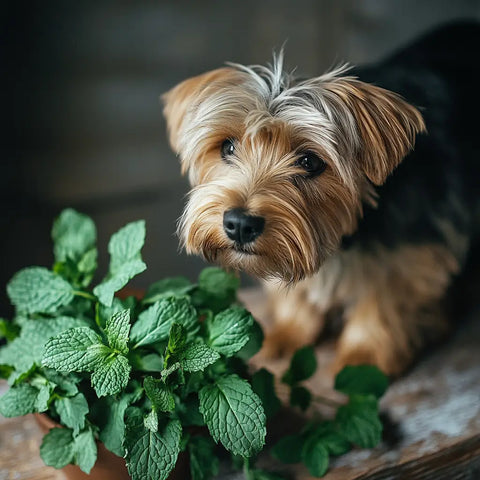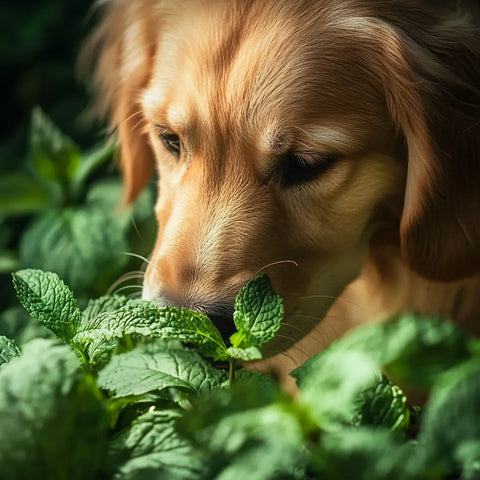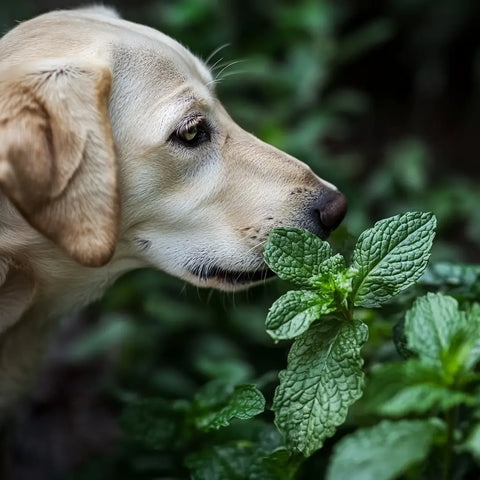If you're a dog owner, you might be curious about the growing trend of using essential oils like peppermint oils for pet dogs. Many people swear by the benefits of peppermint oil for humans. However, in the meantime, it's important to consider whether this popular remedy is safe for your furry friends. Don’t worry. We’ve got you covered with this article.
In this article, we'll explore the potential risks and benefits of using peppermint oil for dogs in 2025. Therefore, we invite you to keep reading and find out what you need to know before incorporating peppermint oil into your dog's care routine.
Without further ado, let’s get started…

What is Peppermint Oil?
Peppermint oil is a natural essential oil derived from the leaves of the peppermint plant (Mentha piperita), a hybrid of spearmint and watermint. The oil is known for its refreshing, minty scent and its wide range of therapeutic properties.
Extraction Process:
Peppermint oil is typically extracted through a process called steam distillation.
In this method, steam is passed through the peppermint leaves, causing the essential oil to be released and separated. The oil is then condensed and collected. This process preserves the potent compounds in the oil, such as menthol and menthone, which are responsible for its cooling effect and therapeutic benefits.
Common Uses in Human Health and Wellness:
Peppermint oil is widely used in human health and wellness for various purposes. Some of its most notable uses include:
- Relieving digestive issues: Peppermint oil can help soothe digestive discomfort, including bloating and indigestion.
- Easing headaches: The cooling effect of peppermint oil can help alleviate tension headaches and migraines when applied topically or inhaled.
- Reducing muscle pain: Peppermint oil is often used in topical products to relieve sore muscles or joint pain.
- Promoting mental clarity: The invigorating scent of peppermint oil is known to help improve focus and reduce fatigue.
While peppermint oil has numerous benefits for humans, it is important to understand how it affects pets, particularly dogs, before using it in their care routine.
Safety of Peppermint Oil for Dogs
Essential oils, including peppermint oil, can pose risks to your pet dog if not used properly. This is because animals have a more sensitive sense of smell and different metabolic systems compared to humans. This makes them more vulnerable to the potent compounds in essential oils.
When used incorrectly, these essential oils can cause adverse reactions such as skin irritation, respiratory distress, or even poisoning.
For this reason, it's crucial to be cautious when considering essential oils for pets, ensuring that any product used is safe and appropriate for their needs.
Specific Risks Associated with Peppermint Oil:
While peppermint oil has benefits for humans, it can be risky for dogs. Some potential dangers include:
- Toxicity: Peppermint oil can be toxic to dogs when ingested or absorbed in high concentrations. Symptoms of toxicity may include vomiting, diarrhea, lethargy, and even tremors or seizures in extreme cases.
- Skin Irritation: Applying undiluted peppermint oil directly to a dog's skin can lead to irritation, redness, or chemical burns. Dogs may lick or bite at areas where oil has been applied, leading to further ingestion.
- Respiratory Issues: The strong scent of peppermint oil may cause respiratory distress in dogs, especially in those with pre-existing respiratory conditions like asthma or bronchitis. Diffusing peppermint oil in a room could lead to inhalation of concentrated vapors that might irritate the dog’s airways.
Importance of Dilution and Quality Sourcing:
To reduce risks, it is vital to dilute peppermint oil properly before using it on or around dogs. A safe dilution ratio should be followed, and any essential oil products should be well-sourced.
Otherwise, if you use a low-quality oil product instead, it might contain harmful additives or impurities that can increase the risks of toxicity or irritation.
- Dilution: Always dilute peppermint oil with a carrier oil (such as coconut or olive oil) before applying it to a dog’s skin. The recommended dilution is typically one drop of essential oil per 1 tablespoon of carrier oil.
- Quality Sourcing: Ensure that the peppermint oil is 100% pure, organic, and free from harmful chemicals or synthetic additives. Low-quality oils can be more harmful and should be avoided when using them around pets.
Understanding these safety precautions will help you determine whether peppermint oil is a safe option for your dog and how to use it cautiously, if necessary.

Benefits of Peppermint Oil for Dogs
While peppermint oil is widely used in human wellness, some pet dog owners consider its potential benefits for dogs as well. However, it's important to approach these uses with caution and rely on both anecdotal evidence and scientific research to guide decisions.
Below are some potential health benefits:
1. Pain Relief and Anti-Inflammatory Properties:
Peppermint oil contains menthol, which is known for its natural cooling and analgesic (pain-relieving) properties. When diluted properly, it may help alleviate muscle soreness or joint pain in dogs.
Furthermore, some dog owners use peppermint oil in massage therapy to reduce discomfort from arthritis or injury. The oil’s anti-inflammatory effects can also potentially help reduce swelling or irritation caused by injuries or skin conditions when used topically in small amounts.
2. Digestive Aid for Nausea and Cramping:
Peppermint oil has long been used to relieve digestive issues in humans, and it may have similar benefits for dogs. It can help soothe nausea, reduce bloating, and alleviate cramping. Some pet owners use peppermint oil diluted in a carrier oil or added to a diffuser to help calm their dog’s stomach, especially if the dog is experiencing motion sickness or digestive upset.
However, it's essential to note that dogs should not ingest peppermint oil directly due to the risk of toxicity.
Anecdotal Evidence vs. Scientific Research:
While there are many anecdotal reports from dog owners who claim that peppermint oil has helped their pets with various issues, scientific research on the use of peppermint oil for dogs is limited. Most of the information available is based on human studies or observations from pet owners rather than controlled studies involving pets.
- Anecdotal Evidence: Many dog owners report that diluted peppermint oil has helped with their dog's pain relief, especially for muscle and joint discomfort. Some owners also believe it has helped with nausea and digestive issues. However, these experiences can vary widely, and not all dogs will respond the same way.
- Scientific Research: There is a lack of large-scale studies specifically on the use of peppermint oil in dogs. While peppermint oil has been well-studied in humans, much of its use for animals remains anecdotal. Veterinarians generally advise caution and recommend using essential oils only under professional guidance.
However, even though these benefits do exist, always consult with a veterinarian before using peppermint oil as part of your dog's wellness routine.

How to Use Peppermint Oil Safely for Dogs
When using peppermint oil for dogs, it is essential to take proper precautions to ensure safety. Follow these guidelines for dilution, application, and recognizing adverse reactions.
Dilution Guidelines
Peppermint oil is potent and should never be applied to dogs undiluted. Always dilute it with a carrier oil to reduce the risk of irritation or toxicity.
Here are some recommended dilution ratios for topical use:
- 1 drop of peppermint oil per 1 tablespoon of carrier oil (e.g., coconut oil, olive oil, or jojoba oil).
- For larger dogs, you can slightly increase the dilution, but always start with a lower concentration to see how your dog reacts.
Safe Methods of Application
For Topical Use:
Always apply diluted peppermint oil to small, non-sensitive areas of your dog's body, such as the back of the neck or the shoulders. Avoid areas where your dog may lick or groom, as ingestion of peppermint oil can lead to toxicity.
You can gently massage the diluted oil into the skin or use it in homemade dog-friendly sprays for specific uses like calming or relief from muscle pain.
Diffusion:
If you're considering using peppermint oil in a diffuser, be cautious. Ensure the room is well-ventilated and that your dog can leave the area if it feels uncomfortable. Avoid diffusing essential oils for extended periods, especially in small, enclosed spaces.
Keep the diffuser out of your dog’s direct reach to minimize any risk of inhalation of concentrated vapors.
Signs of Adverse Reactions
While peppermint oil can provide benefits, it's crucial to monitor your dog for any signs of negative reactions:
Symptoms of Toxicity or Irritation can include following:
- Vomiting or Diarrhea: Ingesting even small amounts of undiluted peppermint oil can cause digestive upset.
- Excessive Drooling or Licking: If your dog licks a treated area or ingests the oil, it might show signs of excessive drooling or licking as it tries to alleviate discomfort.
- Skin Redness or Rash: Irritation may occur if the oil is not diluted properly or if your dog has sensitive skin.
- Labored Breathing or Coughing: If your dog has respiratory issues or is sensitive to strong smells, peppermint oil may cause labored breathing or coughing.
- Lethargy or Tremors: In severe cases of toxicity, peppermint oil can lead to lethargy, tremors, or even seizures.
What to Do if Exposure Occurs?
If you suspect that your dog has had an adverse reaction to peppermint oil, take immediate action:
- For Skin Irritation: Wash the affected area with mild soap and warm water to remove any residual oil. Apply a soothing ointment if necessary.
- For Ingestion or Toxicity Symptoms: Contact your veterinarian immediately if you suspect your dog has ingested peppermint oil or is showing symptoms of toxicity. Do not attempt to treat the dog yourself, as improper handling may worsen the situation.
- For Respiratory Distress: Move your dog to fresh air immediately and contact your vet if it continues to show signs of respiratory distress.
By following these guidelines, you can safely use peppermint oil for your dog, but always consult with a veterinarian before introducing new treatments into your pet’s care routine.

Importance of Consulting a Veterinarian Before Use
Before introducing peppermint oil or any essential oils into your dog’s routine, it’s crucial to consult with a veterinarian. They can provide personalized advice based on your dog's specific health needs, breed, size, and any pre-existing conditions.
As we discussed before, some dogs may have sensitivities or allergies to certain oils, while others may be at a higher risk of toxicity due to their size or overall health. In these situations. a veterinarian can help you determine whether peppermint oil is a suitable option and guide you on safe usage, including proper dilution and application techniques.
Furthermore, never use peppermint oil as a substitute for professional veterinary care, especially when dealing with health concerns or emergencies.
Recommendations for Reputable Brands and Products
If your veterinarian gives the green light for using peppermint oil, choosing high-quality, reputable products is essential to ensure your dog’s safety. Here are some key tips for selecting the right peppermint oil:
- 100% Pure Essential Oil: Look for peppermint oil that is labeled as 100% pure, without any added fillers, chemicals, or synthetic fragrances. Always choose organic oils to minimize the risk of pesticides or harmful additives.
- Vet-Approved Brands: Some companies specifically produce essential oils and blends for pets. These brands often adhere to stringent quality control measures and focus on pet safety. Look for brands that are recommended by veterinarians or have received positive reviews from reputable pet health sources.
- Diluted Products for Pets: Consider using products that are already diluted for pets. These are often in the form of sprays, balms, or topical oils that have been pre-mixed with safe carrier oils, making them ready for use on dogs without additional dilution.
- Avoid Synthetic Fragrances or Additives: Always choose products that are free from synthetic fragrances or additives, which can be harmful to pets. Natural, organic products are generally the safest option.
Brands to consider include:
- Plant Therapy PetSafe Line: Known for providing essential oils and blends formulated specifically for pets, with safety guidelines and recommendations for use.
- Rocky Mountain Oils (Pet Line): Offers essential oils that are safe for pets, including options for dilution and usage specifically for dogs.
- DoTerra or Young Living (with Vet Consultation): These brands are known for their high-quality, pure essential oils. However, always consult with your veterinarian before use, as they are not formulated specifically for pets.
By choosing reputable products and consulting your veterinarian, you can ensure that your dog’s safety and well-being are prioritized while using peppermint oil or any essential oil.
Where to Buy the Best Dog Products for Your Furry Friend in 2024
Ready to pamper your dog with top-quality products? At our own store Doggy Elite, we offer a wide selection of essential and luxurious items to enhance your pet’s life, from engaging toys to cozy beds and stylish accessories.
Here’s why Doggy Elite is your premier destination for dog products:
- Quality Assurance: Our products are carefully selected to meet the highest standards of safety and durability, ensuring your pet enjoys every item for years to come.
- Wide Selection: We provide a diverse range of categories including Dog Toys, House & Bed, Grooming & Care, Accessories, Harness & Leashes, Clothing, Collars, Feeding, Traveling, and Paw Prints. Whatever you need, we have something for every dog.
- Competitive Pricing: Enjoy great value with our affordable prices, making it easy to spoil your furry friend without breaking the bank.
- Customer Satisfaction: Our dedicated team is committed to providing outstanding customer service, helping you choose the perfect products for your dog and offering guidance when needed.
Therefore, we invite you to explore our range of dog products today. Click below to visit our store and discover the perfect items for your beloved pet!
Final Thoughts
In conclusion, while peppermint oil offers several potential benefits for humans, its use on dogs requires caution.
Peppermint oil can be toxic if ingested, cause skin irritation if not properly diluted, and may lead to respiratory issues in sensitive dogs. Therefore, it’s crucial to consult with a veterinarian before incorporating peppermint oil into your dog’s care routine.
If your vet approves its use, ensure that you use high-quality, well-sourced peppermint oil and follow proper dilution guidelines to minimize risks. Always monitor your dog for any adverse reactions and seek immediate veterinary help if necessary.
Key Takeaways
- Peppermint oil is derived from the peppermint plant and contains compounds like menthol and menthone, which contribute to its therapeutic properties.
- Peppermint oil is commonly used for digestive relief, headache reduction, muscle pain alleviation, and improving mental clarity in humans.
- Dogs have a more sensitive sense of smell and metabolic systems, making them more susceptible to essential oils like peppermint, which can cause adverse reactions.
- Ingesting or absorbing high concentrations of peppermint oil can lead to toxicity in dogs, with symptoms like vomiting, diarrhea, lethargy, and even seizures in extreme cases.
- Undiluted peppermint oil can cause skin irritation, redness, or burns when applied to a dog's skin, especially if they lick the area afterward.
- Diffusing peppermint oil in closed spaces or exposing dogs to strong scents can lead to respiratory distress, particularly in dogs with pre-existing conditions like asthma.
- To reduce the risks of toxicity or irritation, peppermint oil should always be properly diluted with a carrier oil, with a recommended ratio of 1 drop of essential oil to 1 tablespoon of carrier oil.
- Before using peppermint oil or any essential oils for dogs, consult with a veterinarian to ensure the safety and appropriateness for your pet's health and breed.
- When used properly, peppermint oil may provide some benefits, including pain relief, anti-inflammatory effects, and digestive aid for dogs, particularly in cases of muscle pain, nausea, and cramping.
- If approved by a vet, always choose high-quality, 100% pure peppermint oil or pet-specific products that are already diluted to ensure your dog’s safety.
FAQs
Can I use peppermint oil to repel fleas on my dog?
No, peppermint oil is not recommended for flea control on dogs. Use veterinarian-approved flea treatments instead.
Is it safe to diffuse peppermint oil in a room where my dog sleeps?
No, it's best to avoid diffusing peppermint oil in areas where your dog rests or cannot escape the scent.
What should I do if my dog licks peppermint oil?
Contact your veterinarian or pet poison control immediately. Do not wait for symptoms to appear.
Are there any safe ways to use peppermint around dogs?
The safest approach is to avoid peppermint oil entirely. If necessary, use only highly diluted forms under veterinary guidance.
Can I use peppermint-scented products around my dog?
Commercial peppermint-scented products designed for pets may be safe, but always check with your veterinarian first.

